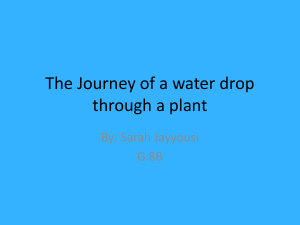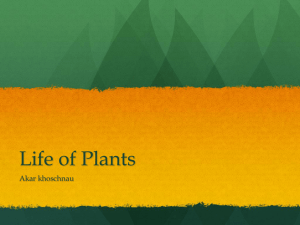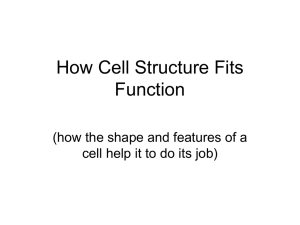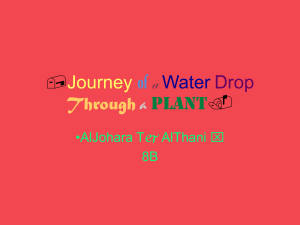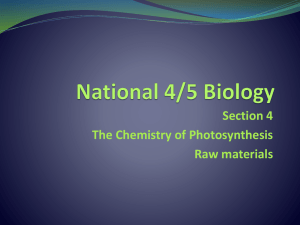Journey of a Waterdrop
advertisement
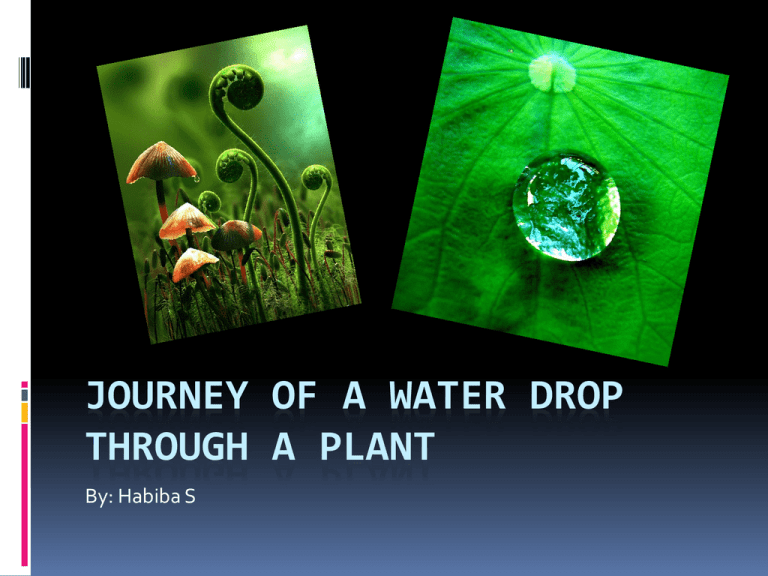
JOURNEY OF A WATER DROP THROUGH A PLANT By: Habiba S WHY DO PLANTS NEED WATER? Photosynthesis is the process plants use to create food, they require water to do so. Plants also need carbon dioxide to make food, transpiration is the exchange of water for carbon dioxide, this happens when the water evaporates through tiny openings in the leaves called stomata. WHY DO PLANTS NEED WATER? Turgidity uses water to put pressure on the cells in the plant to prevent it form wilting. Water acts as a solvent to help transport nutrients in a liquid form around the plant to keep it alive. STAGE 1: THE ROOTS The journey of the water drop begins at the roots of the plants. The absorption of water is taken care of by the younger parts of the roots called root hairs. Root hairs increase the area where absorption can take place, this is done by the process of osmosis. Osmosis is the movement of water from an area with a high concentration of water, to a a place with less concentration. STAGE 2: XYLEM & PHLOEM After entering the root hairs, the water needs to be transferred upwards to the stems and leaves through a vascular tissue called xylem. This happens because water molecules are stuck the xylem by adhesion. Water molecules carry a slight electric charge, which cause them to attract to each other. This attraction is known as cohesion, linking water molecules in long chains. STAGE 2: XYLEM & PHLOEM Phloem is another tissue in the plant, though it is responsible for moving around food manufactured in the leaves by photosynthesis around the plant. Water diffuses from the xylem into the phloem. STAGE 3: PHOTOSYNTHESIS & STOMATA When the water reaches the leaves, it escapes the xylem through tiny holes on the surface of the leaves called stomata. When a molecule evaporates is pulls another to replace it, this helps the chain of water molecules continue while keeping the pressure low to allow water and nutrients to come in from the roots through the process of osmosis. STAGE 3: PHOTOSYNTHESIS & STOMATA Water could also go the photosynthesis process to create food for the plant, which usually takes place in the leaves of the plant. Photosynthesis is the process of converting light energy to chemical energy, this process takes place in the chloroplast specifically using chlorophyll. STAGE 3: PHOTOSYNTHESIS & STOMATA Inside the leaf there is a layer of cells called the mesophyll. The mesophyll can be divided into 2 layers, the palisade cells and the spongy cells. Palisade cells are where photosynthesis occurs, when converting light energy to chemical energy Spongy cells are more loosely packed, and that allows space for gas exchange. Bibliography "Biology: Water Movement." Biology: Water Movement. N.p., n.d. Web. 24 Mar. 2013. "LEAF ANATOMY." Leaf Anatomy. N.p., n.d. Web. 24 Mar. 2013. "Microscopy-UK Micscape Microscopy and Microscopes Magazine." Microscopy-UK Micscape Microscopy and Microscopes Magazine. N.p., n.d. Web. 24 Mar. 2013. "Photosynthesis." Photosynthesis. N.p., n.d. Web. 24 Mar. 2013. "Plant Life." : Water and Solute Movement in Plants. N.p., n.d. Web. 24 Mar. 2013. "Science Aid: Plant Cells." Science Aid: Plant Cells. N.p., n.d. Web. 24 Mar. 2013. "Water Movement in Plants." YouTube. YouTube, 12 Dec. 2010. Web. 24 Mar. 2013. "Why Do Plants Need Water?" Why Do Plants Need Water? N.p., n.d. Web. 24 Mar. 2013. Bibliography - Images Works Cited "BELAJAR BERSAMA PAGURUS SP." Stomata ~. N.p., n.d. Web. 24 Mar. 2013. "Dictionary FREE." English Explanatory Dictionary Online Phloem. N.p., n.d. Web. 24 Mar. 2013. "Dreams of Biology." : Plants and Mushrooms-e-books. N.p., n.d. Web. 24 Mar. 2013. "How the Earth Works." HowStuffWorks. N.p., n.d. Web. 24 Mar. 2013. "Nutrition." Carica Papaya -. N.p., n.d. Web. 24 Mar. 2013. "Photosynthesis & Cellular Respiration." Photosynthesis & Cellular Respiration. N.p., n.d. Web. 24 Mar. 2013. "Root." HowStuffWorks. N.p., n.d. Web. 24 Mar. 2013. "WATER ON PLANTS WALLPAPERS | WATER ON PLANTS Scenery Desktop Wallpapers | Natural Landscape | Nature Wallpapers." Nature Wallpapers. N.p., n.d. Web. 24 Mar. 2013. "The Water Unit Project." The Water Unit Project. N.p., n.d. Web. 24 Mar. 2013. "Water-garden-plant." 99MAG. N.p., n.d. Web. 24 Mar. 2013.
